
Related
Vigils are being held across the country following what has been described as the deadliest mass shooting in modern American history and the deadliest attack ever on the LGBT community in the United States. At least 50 people died in Orlando, Florida, early Sunday morning after a gunman opened fire at a packed gay dance club. More than 50 others were injured. The victims were mostly Latino. Three hours after the shooting began, authorities say, the gunman was shot dead when police raided the club. We speak to Hannah Willard of Equality Florida.
Transcript
AMY GOODMAN: Vigils are being held across the country following what’s been described as the deadliest mass shooting in modern American history. At least 50 people died in Orlando, Florida, early Sunday morning after a gunman opened fire at a packed gay dance club. More than 50 others were injured. The victims were mainly Latino, many of them Puerto Rican. Three hours after the shooting began, authorities say, the gunman was shot dead when police raided the club. The shooting was the deadliest attack on the LGBT community in American history. The attack came in the middle of Pride month. Witnesses described scenes of terror inside the club.
JANIEL GONZALEZ: He just kept on shooting and shooting and shooting and just walking around.
REPORTER: Was it rapid fire? Was it single shots?
JANIEL GONZALEZ: No, it was rapid fire. It was like brrrrrr. And then he’d like change, put another ammunition, brrrrrrrr, and then change, put another ammunition. And I could just smell the ammo in the air, and I was like, “This is a gun. This isn’t fireworks. Like, we need to leave.”
AMY GOODMAN: For over a decade, the Pulse was a popular destination for the LGBT community in central Florida. It opened in 2004 by Barbara Poma to celebrate her brother, who had died of AIDS. President Obama addressed the nation on Sunday afternoon.
PRESIDENT BARACK OBAMA: So this is a sobering reminder that attacks on any American, regardless of race, ethnicity, religion or sexual orientation, is an attack on all of us and on the fundamental values of equality and dignity that define us as a country. And no act of hate or terror will ever change who we are or the values that make us Americans.
Today marks the most deadly shooting in American history. The shooter was apparently armed with a handgun and a powerful assault rifle. This massacre is therefore a further reminder of how easy it is for someone to get their hands on a weapon that lets them shoot people in a school or in a house of worship or a movie theater or in a nightclub. And we have to decide if that’s the kind of country we want to be. And to actively do nothing is a decision, as well.
AMY GOODMAN: Authorities identified the gunman as 29-year-old Omar Mateen. He used a semiautomatic weapon that would have been prohibited under the assault weapons ban that Congress allowed to expire more than a decade ago. Since 2007, Mateen had worked as a security guard at G4S, the largest private security firm in the world. He was born in 1986 in New York to Afghan parents. The FBI interviewed him in 2013 and 2014 for possible terrorist ties. According to The New York Times, he was placed under FBI surveillance for a time, but the agency eventually closed its inquiry. There are reports Mateen called 911 just after the initial assault and when he was inside the club, and declared his allegiance to the Islamic State, but no audio of the call has been released to the public. Mateen’s father told NBC his son had been angered after seeing two men kissing in Miami. Mateen’s former wife told reporters he was mentally unstable and used to beat her.
SITORA YUSUFIY: In the beginning, he was a normal being, that cared about family, loved to joke, loved to have fun. But then, a few months after we were married, I saw his instability, and I saw that he was bipolar, and he would get mad out of nowhere. That’s when I started worrying about my safety. And then, after a few months, he started abusing me physically, very often, and not allowing me to speak to my family, keeping me hostage from them. And I tried to see the good in him even then, but my family was very tuned into what I was going through, and decided to visit me and rescue me out of that situation.
AMY GOODMAN: Joining us now in Orlando, Florida, is Hannah Willard, policy and outreach coordinator for Equality Florida. Here in New York, we’re joined by Daniel Leon-Davis. He grew up in Orlando. He was a regular at the Pulse nightclub. He’s the senior creative director of Soze. He wrote a piece for Fusion titled “The Site of the Orlando Shooting Wasn’t Just a Gay Nightclub. It was My Safe Haven.”
Hannah and Daniel, welcome to Democracy Now! Hannah, let’s begin with you. You’re in Orlando near the scene of the crime. Can you describe what you understand took place and the significance of the nightclub where it happened?
HANNAH WILLARD: Well, thank you for having me. This act of senseless violence has left us all reeling. For this to have taken place during Pride Month, in June, adds an extra layer of horror to the LGBTQ community being targeted in this way. Gay nightclubs are absolutely safe havens for our community, for so many of us. They were the first place where we really could be our authentic selves. Pride Month is when we mark the Stonewall riots, when we come together to take pride in who we are. This act of hatred has left us all shocked and mourning for those we’ve lost.
AMY GOODMAN: You mentioned the Stonewall riots, and many flowers were placed at the Stonewall here in New York, really the launch of the modern-day gay rights movement in this country. Talk about the significance of the Pulse in Orlando.
HANNAH WILLARD: Pulse nightclub is an institution here in Orlando. This is my hometown. I grew up here. I’m proud to live here. And Pulse nightclub is a place where all of us went to have a fun night out with our friends. You know, gay and transgender people, we want the same things everyone else wants. We want to be able to earn a living, provide for our families and go out dancing with our friends.
And yesterday I was at a small gathering where someone asked, “Will we be able to make Pulse safe again?” And my answer is, I’m sure we will, because gay and transgender people have always carved out safe spaces for ourselves amidst adversity. Our community is no stranger to violence, to hatred and to antagonism, and we’re no stranger to getting back up and moving forward stronger than ever. I’m thankful for the solidarity that our community has felt yesterday and today in the midst of our grief.
AMY GOODMAN: Hannah, do you see this as a hate crime?
HANNAH WILLARD: There’s no question that homophobia and hatred and bigotry are alive and well here in Florida and across our country. We may never know exactly what was in the heart of this man that inspired him to commit this act of hatred and violence, but what we do know is that in the midst of this grief, we are more committed than ever to uproot the homophobia, the hatred and the bigotry that sparks this kind of violence. We’re committed to uprooting that anywhere it exists, be it homophobia, transphobia, Islamophobia, sexism, racism, anywhere it exists. That’s our commitment as Equality Florida.

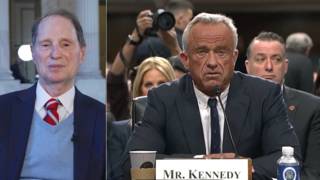
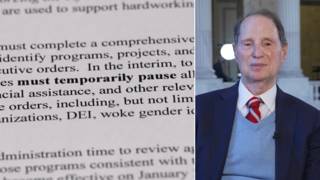
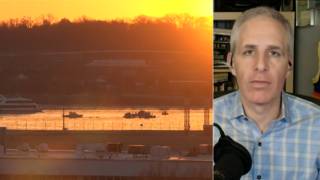
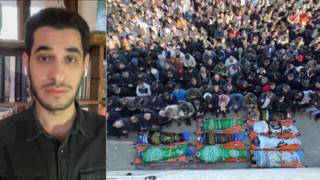





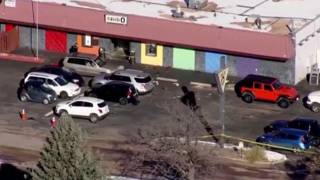
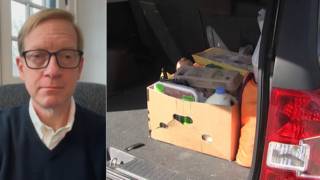
Media Options